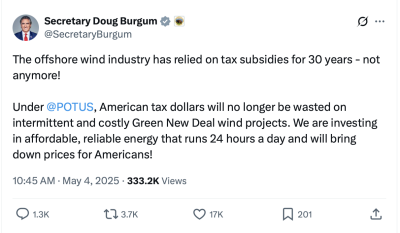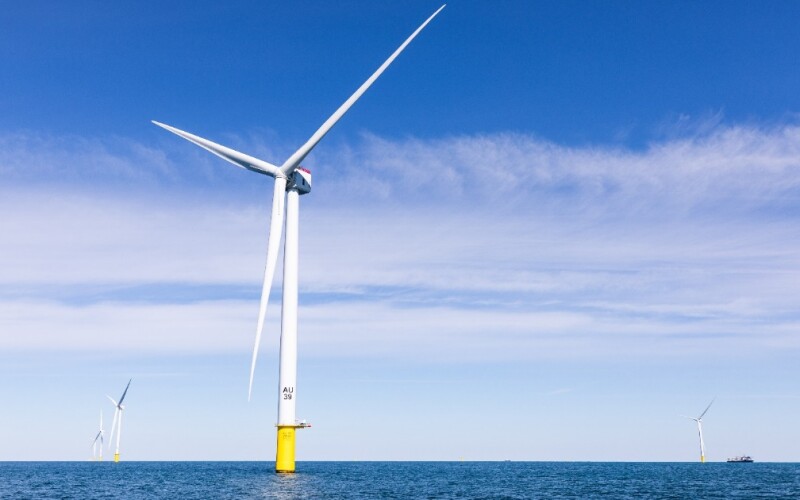Interior Secretary Doug Burgum explicitly promised to end federal support for offshore wind projects, days after his agency moved to reinstate stricter standards for permitting energy projects on the outer continental shelf.
“The offshore wind industry has relied on tax subsidies for 30 years - not anymore!” Burgum wrote in a May 4 social media post.
Under the Trump administration, “American tax dollars will no longer be wasted on intermittent and costly Green New Deal wind projects,” Burgum wrote. “We are investing in affordable, reliable energy that runs 24 hours a day and will bring down prices for Americans!”

The Interior Department had already moved decisively to halt work on Equinor’s Empire Wind project off New York, when Burgum on April 16 directed the Bureau of Ocean Energy Management to issue a stop-work order on the planned 810-megawatt array of 54 turbines.
The opinions deal with a subsection of the 1953 law that grants the Interior secretary
The earlier opinions were issued during another tumultuous time for the fledging U.S. offshore wind industry. In late 2020 during the final days of Trump’s first term, Interior officials moved to revoke permits for the Vineyard Wind project off southern New England.
Days after the Biden administration arrived in late January 2021, the department reversed course to ensure Vineyard Wind could proceed – and embarked on a campaign to accelerate new approvals and planning for other projects.
An opinion then issued by Interior’s then-deputy solicitor Robert Anderson addressed how outer continental shelf energy leasing should be view in light of potential conflict with other uses.
The new reversal in Zerzan’s opinion cites a U.S. Supreme Court decision in June 2024 that limits government agencies’ ability to interpret federal statutes.
That case, known as Loper Bright v. Department of Commerce and Relentless v. Department of Commerce, was brought on behalf of New Jersey and Rhode Island fishermen who challenged a National Marine Fisheries Service rule requiring them to carry onboard observers to monitor fishing.
The cases hinged on the so-called "Chevron deference," a landmark ruling in federal administrative law dating back to a 1984 dispute between the oil giant and environmental activists In that earlier Supreme Court decision, justices ruled that the courts should “defer” to executive agencies’ reasonable interpretations of federal statutes.
In the 6-3 majority opinion, Chief Justice John Roberts wrote that “Chevron’s presumption is misguided because agencies have no special competence in resolving statutory ambiguities. Courts do.”
In the new Interior legal opinion, Zerzan said Loper Bright helps to clarify the agency’s role.
‘Questions of statutory interpretation are notoriously fraught exercises subject to no small amount of conflicting methods and precedent. However…the U.S.




